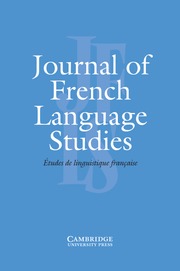Article contents
French future: Exploring the future ratification hypothesis
Published online by Cambridge University Press: 28 July 2015
Abstract
The paper proposes a unified account of the systematic polysemy of French future (FUT) that does not uniquely rely on Aktionsart. It explains the predominant preference for the temporal interpretation of FUT, appealing to the ‘future ratification hypothesis’. This is a felicity condition that can be satisfied to different degrees and among competing interpretations the one that satisfies it to the highest degree is preferred. The paper also shows that FUT does not convey uncertainty at utterance time (tu), and can be used when the attitude holder knows at tu that the embedded proposition is true.
- Type
- Articles
- Information
- Copyright
- Copyright © Cambridge University Press 2015
References
REFERENCES
- 8
- Cited by





